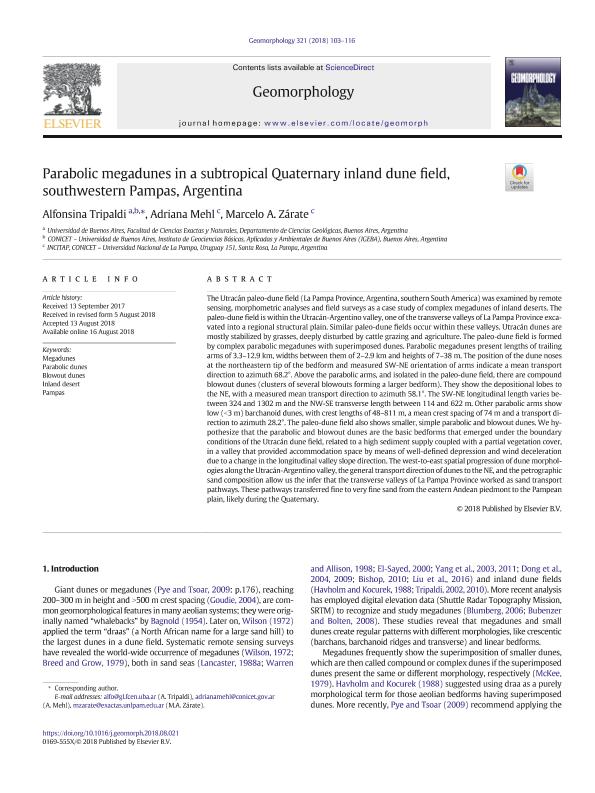Mostrar el registro sencillo del ítem
dc.contributor.author
Tripaldi, Alfonsina

dc.contributor.author
Mehl, Adriana Ester

dc.contributor.author
Zárate, Marcelo Arístides

dc.date.available
2019-10-29T21:27:24Z
dc.date.issued
2018-11
dc.identifier.citation
Tripaldi, Alfonsina; Mehl, Adriana Ester; Zárate, Marcelo Arístides; Parabolic megadunes in a subtropical Quaternary inland dune field, southwestern Pampas, Argentina; Elsevier Science; Geomorphology; 321; 11-2018; 103-116
dc.identifier.issn
0169-555X
dc.identifier.uri
http://hdl.handle.net/11336/87624
dc.description.abstract
The Utracán paleo-dune field (La Pampa Province, Argentina, southern South America) was examined by remote sensing, morphometric analyses and field surveys as a case study of complex megadunes of inland deserts. The paleo-dune field is within the Utracán-Argentino valley, one of the transverse valleys of La Pampa Province excavated into a regional structural plain. Similar paleo-dune fields occur within these valleys. Utracán dunes are mostly stabilized by grasses, deeply disturbed by cattle grazing and agriculture. The paleo-dune field is formed by complex parabolic megadunes with superimposed dunes. Parabolic megadunes present lengths of trailing arms of 3.3–12.9 km, widths between them of 2–2.9 km and heights of 7–38 m. The position of the dune noses at the northeastern tip of the bedform and measured SW-NE orientation of arms indicate a mean transport direction to azimuth 68.2°. Above the parabolic arms, and isolated in the paleo-dune field, there are compound blowout dunes (clusters of several blowouts forming a larger bedform). They show the depositional lobes to the NE, with a measured mean transport direction to azimuth 58.1°. The SW-NE longitudinal length varies between 324 and 1302 m and the NW-SE transverse length between 114 and 622 m. Other parabolic arms show low (<3 m) barchanoid dunes, with crest lengths of 48–811 m, a mean crest spacing of 74 m and a transport direction to azimuth 28.2°. The paleo-dune field also shows smaller, simple parabolic and blowout dunes. We hypothesize that the parabolic and blowout dunes are the basic bedforms that emerged under the boundary conditions of the Utracán dune field, related to a high sediment supply coupled with a partial vegetation cover, in a valley that provided accommodation space by means of well-defined depression and wind deceleration due to a change in the longitudinal valley slope direction. The west-to-east spatial progression of dune morphologies along the Utracán-Argentino valley, the general transport direction of dunes to the NE, and the petrographic sand composition allow us the infer that the transverse valleys of La Pampa Province worked as sand transport pathways. These pathways transferred fine to very fine sand from the eastern Andean piedmont to the Pampean plain, likely during the Quaternary.
dc.format
application/pdf
dc.language.iso
eng
dc.publisher
Elsevier Science

dc.rights
info:eu-repo/semantics/openAccess
dc.rights.uri
https://creativecommons.org/licenses/by-nc-sa/2.5/ar/
dc.subject
BLOWOUT DUNES
dc.subject
INLAND DESERT
dc.subject
MEGADUNES
dc.subject
PAMPAS
dc.subject
PARABOLIC DUNES
dc.subject.classification
Geología

dc.subject.classification
Ciencias de la Tierra y relacionadas con el Medio Ambiente

dc.subject.classification
CIENCIAS NATURALES Y EXACTAS

dc.title
Parabolic megadunes in a subtropical Quaternary inland dune field, southwestern Pampas, Argentina
dc.type
info:eu-repo/semantics/article
dc.type
info:ar-repo/semantics/artículo
dc.type
info:eu-repo/semantics/publishedVersion
dc.date.updated
2019-10-15T15:17:34Z
dc.journal.volume
321
dc.journal.pagination
103-116
dc.journal.pais
Países Bajos

dc.journal.ciudad
Amsterdam
dc.description.fil
Fil: Tripaldi, Alfonsina. Consejo Nacional de Investigaciones Científicas y Técnicas. Oficina de Coordinación Administrativa Ciudad Universitaria. Instituto de Geociencias Básicas, Aplicadas y Ambientales de Buenos Aires. Universidad de Buenos Aires. Facultad de Ciencias Exactas y Naturales. Instituto de Geociencias Básicas, Aplicadas y Ambientales de Buenos Aires; Argentina
dc.description.fil
Fil: Mehl, Adriana Ester. Consejo Nacional de Investigaciones Científicas y Técnicas. Instituto de Ciencias de la Tierra y Ambientales de La Pampa. Universidad Nacional de La Pampa. Facultad de Ciencias Exactas y Naturales. Instituto de Ciencias de la Tierra y Ambientales de La Pampa; Argentina
dc.description.fil
Fil: Zárate, Marcelo Arístides. Consejo Nacional de Investigaciones Científicas y Técnicas. Instituto de Ciencias de la Tierra y Ambientales de La Pampa. Universidad Nacional de La Pampa. Facultad de Ciencias Exactas y Naturales. Instituto de Ciencias de la Tierra y Ambientales de La Pampa; Argentina
dc.journal.title
Geomorphology

dc.relation.alternativeid
info:eu-repo/semantics/altIdentifier/url/https://www.sciencedirect.com/science/article/pii/S0169555X18303180
dc.relation.alternativeid
info:eu-repo/semantics/altIdentifier/doi/http://dx.doi.org/10.1016/j.geomorph.2018.08.021
Archivos asociados
